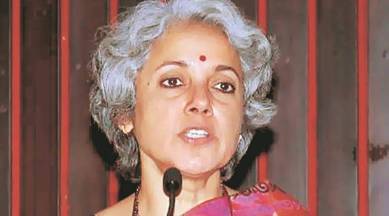The BA.4 and BA.5 Omicron sub-variants are making their presence felt across various areas in the country with the daily Covid tally now showing a rise in the country. When contacted, Dr Soumya Swaminathan, WHO chief scientist, told The Indian Express that it could be the start of a mini wave.
“The sub-variants that are emerging are more transmissible than the original Omicron BA.1 and there is a likelihood of waning immunity. It is a possibility that there could be mini waves every four-six months or so and hence, apart from all Covid-appropriate precautionary measures that need to be taken, it is important to also track the variant,” Dr Swaminathan said.
The WHO chief scientist also felt that due to home-based self testing, numbers could also be underestimated. “We need to keep a watch on hospital-based admissions and ensure that the vulnerable group who are 60 years and above get their booster doses,” Dr Swaminathan said.
Referring to the recent fifth Covid wave in South Africa that was led by Omicron BA.4 and BA.5, Dr Swaminathan said it was a smaller one. According to a WHO report (June 2), new cases had decreased after four consecutive weeks of increase across Africa, signalling the possibility that the latest surge had reached its peak.
According to Dr Gagandeep Kang, a noted virologist and professor at Christian Medical College, Vellore, “this is really whether one is considering a wave as cases or as illness that results in hospitalisation. In either case, what is clear is that what we are seeing now is most likely to be sub-variants of Omicron. They are capable of infecting people who have been previously infected but not necessarily causing the disease(in those who have recently been infected or vaccinated). Those at high risk of severe disease are the unvaccinated, aged people who have been vaccinated a long time ago or people who have comorbidities and the vaccines have not worked in them. In general, if you are healthy and vaccinated you may get infected but there is no need to panic or worry. We are likely to see more such waves and this is going to be the new pattern of the disease that we will see. Every time there is a variant or sub-variant, there will be an increase in cases.”
Dr Sanjay Pujari, technical expert with ICMR’s Covid-19 task force, said that to say it is a wave pan-India is difficult as there are regional spikes across various hotspots. “However , these spikes need to be observed. For instance the United States had a spike in cases in the last four to six weeks and now have reported to show a decline in the last two days,” Dr Pujari said. To term it a wave would also essentially mean the number of infections impacting the healthcare systems, and not just the numbers but also the cases with severe illness, he said.
Globally, the number of reported Covid-19 cases and deaths are declining. According to a WHO report, during the week of May 30 to June 5, over three million cases were reported globally, a 12 per cent decrease as compared to the previous week. The number of new weekly deaths also continued to decline with over 7,600 fatalities reported, showing a 22 per cent decrease as compared to the previous week.
Story continues below this ad
However while it is an encouraging trend, the WHO has urged caution. At a virtual media briefing on June 8, Director General Dr Tedros Adhanom Ghebreyesus, in his opening remarks, said that almost 18 months since the first vaccine was administered, 68 countries have still not achieved 40 per cent coverage.
“More than 7,000 people lost their lives to the virus last week — that’s 7,000 too many. A new and even more dangerous variant could emerge at any time and vast numbers of people remain unprotected. The pandemic is not over and we will keep saying it’s not over until it is,” said Dr Tedros.
